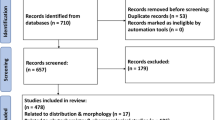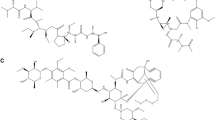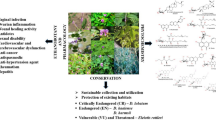Abstract
Lung cancer is the leading cause of cancer-related deaths throughout the world. Extracts of medicinal plants are believed to contain different chemopreventive or chemotherapeutic compounds. In this study, we determined the anti-cancer property of one of the traditional Indian medicine Rasagenthi Lehyam (RL) for the treatment of lung cancer. Two lung cancer cell lines (A-549 and H-460) and one normal bronchial epithelial (BEAS-2B) cell line were used to test the chemotherapeutic effect of RL. Out of five fractions of RL, chloroform fraction of RL (cRL) demonstrated a significant inhibition of cell proliferation and induction of apoptosis in A-549 and H-460 cells but not in normal BEAS-2B cells. The cRL fraction up-regulated the pro-apoptotic genes p53 and Bax and induced caspase-3 activation, and down-regulated the pro-survival gene Bcl-2 in both the lung cancer cell lines. Also, nuclear export of p53 was seen in cRL-treated lung cancer cells. In addition, cRL induced G2/M arrest of cell cycle and enhanced the radio-sensitivity of both the lung cancer cell lines. This study suggests that cRL may prove to be a potent anti-cancer agent that may be used for the treatment of lung cancer. However, further studies are required to bring cRL into the mainstream of medicine in the treatment of lung cancer. (Mol Cell Biochem xxx: 125–133, 2005)
Similar content being viewed by others
References
Parkin DM, Bray F, Ferlay J, Pisani P: Global cancer statistics, 2002. CA Cancer J Clin 55: 74–108, 2005
Murphy SL: Deaths: final data for 1998. Natl Vital Stat Rep 48: 1–105, 2000
Ries LA, Wingo PA, Miller DS, Howe HL, Weir HK, Rosenberg HM, Vernon SW, Cronin K, Edwards BK: The annual report to the nation on the status of cancer, 1973–1997, with a special section on colorectal cancer. Cancer 88: 2398–2424, 2000
ten Bokkel Huinink WW, Bergman B, Chemaissani A, Dornoff W, Drings P, Kellokumpu-Lehtinen PL, Liippo K, Mattson K, von Pawel J, Ricci S, Sederholm C, Stahel RA, Wagenius G, Walree NV, Manegold C: Single-agent gemcitabine: an active and better tolerated alternative to standard cisplatin-based chemotherapy in locally advanced or metastatic non-small cell lung cancer. Lung Cancer 26: 85–94, 1999
Sandler AB, Nemunaitis J, Denham C, von Pawel J, Cormier Y, Gatzemeier U, Mattson K, Manegold C, Palmer MC, Gregor A, Nguyen B, Niyikiza C, Einhorn LH: Phase III trial of gemcitabine plus cisplatin versus cisplatin alone in patients with locally advanced or metastatic non-small-cell lung cancer. J Clin Oncol 18: 122–130, 2000
Eisenberg DM, Davis RB, Ettner SL, Appel S, Wilkey S, van Rompay M, Kessler RC: Trends in alternative medicine use in the United States, 1990–1997: results of a follow-up national survey. JAMA 280: 1569–1575, 1998
Sadava D, Ahn J, Zhan M, Pang ML, Ding J, Kane SE: Effects of four Chinese herbal extracts on drug-sensitive and multidrug-resistant small-cell lung carcinoma cells. Cancer Chemother Pharmacol 49: 261–266, 2002
Cragg GM, Newman DJM, Snader KM: Natural products in drug discovery and development. J Nat Prod 60: 52–60, 1997
Hu H, Ahn NS, Yang X, Lee YS, Kang KS: Ganoderma lucidum extract induces cell cycle arrest and apoptosis in MCF-7 human breast cancer cell. Int J Cancer 102: 250–253, 2002
Agarwal C, Singh RP, Agarwal R: Grape seed extract induces apoptotic death of human prostate carcinoma DU145 cells via caspases activation accompanied by dissipation of mitochondrial membrane potential and cytochrome-c release. Carcinogenesis 23: 1869–1876, 2002
Kao ST, Yeh CC, Hsieh CC, Yang MD, Lee MR, Liu HS, Lin JG: The Chinese medicine Bu-Zhong-Yi-Qi-Tang inhibited proliferation of hepatoma cell lines by inducing apoptosis via G0/G1 arrest. Life Sci 69: 1485–1496, 2001
Bonham M, Arnold H, Montgomery B, Nelson PS: Molecular effects of the herbal compound PC-SPES: identification of activity pathways in prostate carcinoma. Cancer Res 62: 3920–3924, 2002
White E: Life, death and the pursuit of apoptosis. Genes Dev 10: 1–15, 1996
Staunton MJ, Gaffney EF: Apoptosis: basic concepts and potential significance in human cancer. Arch Pathol Lab Med 122: 310–319, 1998
Tanaka H, Arakawa H, Yamaguchi T, Shiraishi K, Fukuda S, Matsui K, Takei Y, Nakamura Y: A ribonucleotide reductase gene involved in a p53-dependent cell-cycle checkpoint for DNA damage. Nature 404: 42–49, 2000
Vogelstein B, Kinzler KW: p53 Function and dysfunction. Cell 70: 523–526, 1992
Levine AJ: p53, The cellular gatekeeper for growth and division. Cell 88: 323–331, 1997
Miyashita T, Krajewski S, Krajewska M, Wang HG, Lin HK, Liebermann DA, Hoffman B, Reed JC: Tumour suppressor p53 is a regulator of Bcl-2 and Bax gene expression in vitro and in vivo. Oncogene 9: 1799–1805, 1994
Fisher TC, Milner AE, Gregory CD, Jackman AL, Aherne GW, Hartley JA, Dive C, Hickman JA: Bcl-2 modulation of apoptosis induced by anti-cancer drugs: resistance to thymidylate stress is independent of classical resistance pathways. Cancer Res 53: 3321–3326, 1993
Boise LH, Gonzalez-Garcia M, Postema CE, Ding L, Lindsten T, Turka LA, Mao X, Nunez G, Thompson CB: Bcl-x, a Bcl-2-related gene that functions as a dominant regulator of apoptotic cell death. Cell 74: 597–608, 1993
Groeger AM, Esposito V, De Luca A, Cassandro R, Tonini G, Ambrogi V, Baldi F, Goldfarb R, Mineo TC, Baldi A, Wolner E: Prognostic value of immunohistochemical expression of p53, Bax, Bcl-2 and Bcl-xL in resected non-small-cell lung cancers. Histopathology 44: 54–63, 2004
Green DR, Reed JC: Mitochondria and apoptosis. Science 281: 1309–1312, 1998
Ranga RS, Girija R, Nur EAM, Sathishkumar S, Akbarsha MA, Thirugnanam S, Rohr J, Ahmed MM, Chendil D: Rasagenthi Lehyam (RL) a novel complementary and alternative medicine for prostate cancer. Cancer Chemother Pharmacol 54: 7–15, 2004
Sowmyalakshmi S, Nur EAM, Akbarsha MA, Thirugnanam S, Rohr J, Chendil D: Investigation on Semecarpus Lehyam – a Siddha medicine for breast cancer. Planta 220: 910–918, 2005
Chendil D, Ranga RS, Meigooni D, Sathishkumar S, Ahmed MM: Curcumin confers radio-sensitising effect in prostate cancer cell line PC-3. Oncogene 23: 1599–1607, 2004
Ko LJ, Prives C: p53: puzzle and paradigm. Genes Dev 10: 1054–1072, 1996
Hollstein M, Sidransky D, Vogelstein B, Harris CC: p53 Mutations in human cancers. Science 253: 49–53, 1991
Kelloff GJ, Crowell JA, Steele VE, Lubet RA, Malone WA, Boone CW, Kopelovich L, Hawk ET, Lieberman R, Lawrence JA, Ali I, Viner JL, Sigman CC: Progress in cancer chemoprevention: development of diet-derived chemopreventive agents. J Nutr 130: 467S–471S, 2000
Friesen C, Herr I, Krammer PH, Debatin KM: Involvement of the CD95 (APO-1/FAS) receptor/ligand system in drug-induced apoptosis in leukemia cells. Nat Med 2: 574–577, 1996
Brown JM, Wouters BG: Apoptosis, p53 and tumour cell sensitivity to anti-cancer agents. Cancer Res 59: 1391–1399, 1999
Cory S, Adams JM: The Bcl2 family: regulators of the cellular life-or-death switch. Nat Rev Cancer 2: 647–656, 2002
Kroemer G, Reed JC: Mitochondrial control of cell death. Nat Med 6: 513–519, 2000
Vieira HL, Haouzi D, El Hamel C, Jacotot E, Belzacq AS, Brenner C, Kroemer G: Permeabilisation of the mitochondrial inner membrane during apoptosis: impact of the adenine nucleotide translocator. Cell Death Differ 7: 1146–1154, 2000
Chen Q, Gong B, Almasan A: Distinct stages of cytochrome-c release from mitochondria: evidence for a feedback amplification loop linking caspase activation to mitochondrial dysfunction in genotoxic stress-induced apoptosis. Cell Death Differ 7: 227–233, 2000
O'Connor PM, Fan S: DNA damage checkpoints: implications for cancer therapy. Prog Cell Cycle Res 2: 165–173, 1996
Demarcq C, Bunch RT, Creswell D, Eastman A: The role of cell cycle progression in cisplatin-induced apoptosis in Chinese hamster ovary cells. Cell Growth Differ 5: 983–993, 1994
Jackson JR, Gilmartin A, Imburgia C, Winkler JD, Marshall LA, Roshak A: An indolocarbazole inhibitor of human checkpoint kinase (Chk1) abrogates cell cycle arrest caused by DNA damage. Cancer Res 60: 566–572, 2000
Author information
Authors and Affiliations
Corresponding author
Rights and permissions
About this article
Cite this article
Ranga, R.S., Sowmyalakshmi, S., Burikhanov, R. et al. A herbal medicine for the treatment of lung cancer. Mol Cell Biochem 280, 125–133 (2005). https://doi.org/10.1007/s11010-005-8518-3
Received:
Accepted:
Issue Date:
DOI: https://doi.org/10.1007/s11010-005-8518-3




